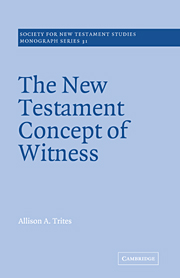Book contents
- Frontmatter
- Contents
- Preface
- Abbreviations
- 1 Introduction
- 2 The witness terminology of secular Greek
- 3 The witness terminology of the Septuagint
- 4 The use of controversy in the Old Testament
- 5 The controversy in Isaiah 40–55
- 6 The idea of witness in other Jewish writings
- 7 The witness terminology of the New Testament
- 8 The concept of witness in the Fourth Gospel
- 9 The concept of witness in the Book of Acts
- 10 The concept of witness in the Book of Revelation
- 11 The idea of witness elsewhere in the New Testament
- 12 Conclusion
- Appendix The use of witnesses and evidence in rabbinical literature
- Bibliography
- Index of references
5 - The controversy in Isaiah 40–55
Published online by Cambridge University Press: 18 December 2009
- Frontmatter
- Contents
- Preface
- Abbreviations
- 1 Introduction
- 2 The witness terminology of secular Greek
- 3 The witness terminology of the Septuagint
- 4 The use of controversy in the Old Testament
- 5 The controversy in Isaiah 40–55
- 6 The idea of witness in other Jewish writings
- 7 The witness terminology of the New Testament
- 8 The concept of witness in the Fourth Gospel
- 9 The concept of witness in the Book of Acts
- 10 The concept of witness in the Book of Revelation
- 11 The idea of witness elsewhere in the New Testament
- 12 Conclusion
- Appendix The use of witnesses and evidence in rabbinical literature
- Bibliography
- Index of references
Summary
In Isaiah 40–55 there are two controversies (one between Yahweh and the world and the other between Yahweh and Israel), and it is important not to confuse the one with the other. Still it is useful to list the legal ideas of Isaiah 40–55, without suggesting that they all belong to a single pattern. Then the results will be applied to understand the use of controversy in Isaiah 40–55. Finally, a few characteristics of the prophet's use of controversy will be brought forward for brief discussion.
THE CONTROVERSY PASSAGES
It may be helpful to list the main passages of Isaiah 40–55 which make use of the language of the lawsuit. They include:
(a) 41: 1–29. The trial of the nations is here dramatically presented. The literary character of the poem reflects its setting in the lawcourt. The formal characteristics of law-court speech are particularly evident in 41: 1–5, 21–4, 26.
(b) 43: 8–13. This poem depicts another trial scene like that of chapter 41, where all nations and Israel are summoned into the divine presence. Witnesses are very prominent in this passage.
(c) 43: 22–8. This passage has the markings of a controversy speech.
(d) 44: 7–8. Hebrew legal terms are used in this passage, and Israel is mentioned as Yahweh's witness.
(e) 45: 20–1. The imagery of the lawcourt is apparent here.
(f) 48: 14–16. The prophet returns to his favourite judgment scene, but the formal characteristics of a controversy are weak.
(g) 50: i–2a. This appears to be a controversy speech; observe the barrage of pointed questions.
(h) 50: 7–9. Legal terminology is notable throughout this passage.
- Type
- Chapter
- Information
- The New Testament Concept of Witness , pp. 35 - 47Publisher: Cambridge University PressPrint publication year: 1977
- 1
- Cited by



